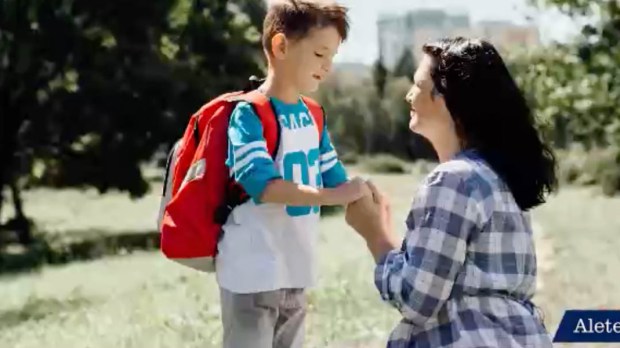Lenten Campaign 2025
This content is free of charge, as are all our articles.
Support us with a donation that is tax-deductible and enable us to continue to reach millions of readers.
Raising a child with special needs brings blessings along with challenges, and a common worry for many parents is how their other children will be affected. Will the other children receive enough attention? How will their sibling’s diagnosis affect them? Watch this heartwarming video to see how one family found a beautiful answer to these concerns.
Colleen Wildenhaus is a teacher and mother to 13-year-old daughter “J,” who has severe anxiety and OCD, and 10-year-old son “R.” Colleen blogs about the family’s story and offers resources to help other families at Goodbye Anxiety, Hello Joy. She recently shared an open letter to her son, which has drawn attention for detailing how her daughter’s special-needs diagnosis has helped shape her son’s character for the better.
Like many parents of special-needs children, Wildenhaus admits in her letter to feeling guilty for the “injustices” her son has to deal with because of his sister’s different needs. “Often being in the background while we navigate our world supporting J’s needs is not a comfortable place to be,” she writes. “I live in a constant state of guilt questioning your perception of what transpires each day.”
Yet she expresses her admiration for her son’s understanding and equanimity in the face of sometimes difficult situations: “You willingly compromise and accommodate your wants and needs knowing that J will be happier because of it. You seldom complain about the change of plans or the seemingly unfair decisions your dad and I have made. You often bear the brunt of J’s outbursts and attitude. These moments that occur all too frequently in your young life are not fair, but they are our reality.”
It is this maturity and willing acceptance of his sister’s needs that make Wildenhaus feel so proud of her son. Living with his sister and learning to accommodate her different needs have given R understanding and emotional awareness far beyond his years.
“I know you are growing into a more compassionate, aware young man,” Wildenhaus writes. “You see the realities of life rather than an image. You see that hard work can produce positive results. You witness honest emotion, learning that it is OK to cry out and ask for help. These moments are shaping who you are.”
Wildenhaus is not the only person to notice her son’s exceptional empathy. He has learned at home to be compassionate, and now as he grows up, he is turning that same skill outward to other kids and friends at school.
“Already, you have stood up for kids being picked on at school,” Wildenhaus writes. “You have been voted ‘Class Pizza’ … everyone likes pizza and you are the kid that everyone likes. You ask about your sister’s day before talking about yourself. Together, these qualities create a man that is an emotionally involved husband, father, and friend. You will be comfortable offering compassion and kindness to those in need, knowing its value rather than seeing it as a weakness.”
Research has shown that the “soft skills” of empathy and emotional awareness are the most valuable for a child’s long-term happiness and success. What parents would not want their child to excel in these areas?
Wildenhaus’ open letter makes clear how her daughter’s special-needs diagnosis has been a source of growth and strength for her son, giving him a kind of “superpower” ability to accept and understand other people. Hopefully other parents of special-needs children can find comfort and support in her powerful words, so that they too can feel confident that their other children will benefit, as R has, from the experience of growing up with a special-needs sibling.

